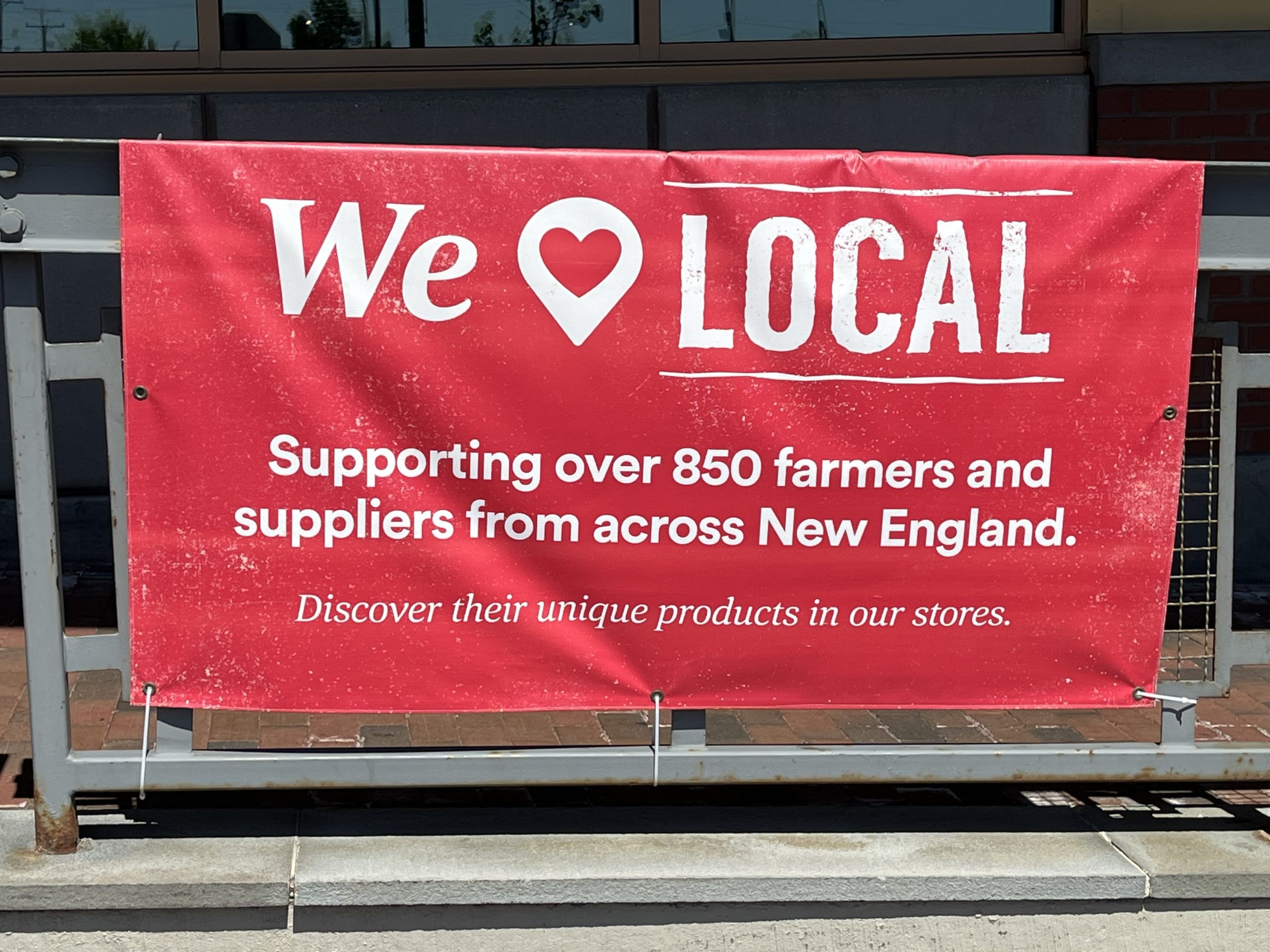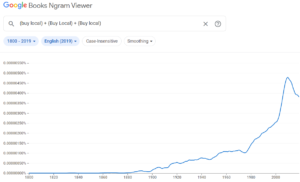
“Buy local” is one of the most simplistic political slogans. It obliterates complex analytical ideas such as the division of labor and comparative advantage. As I wrote in another article,
If something costs less to import, it is better to send the money out of the community and to bring more money back into the community by exporting what local producers have a comparative advantage in.
Google’s Books Ngram Viewer suggests that the expression “buy local” started spreading at the end of the 19th century but grew rapidly only after the mid-1970s (see figure below). It looks like it reached its peak in 2010, although perhaps its occurrence in books (which is what the Ngram Viewer measures) does not correctly measure the phenomenon in popular culture.
Merriam-Webster online defines “local” as “primarily serving the needs of a particular limited district.” Whether something is local depends on how “district” and “limited” are circumscribed. The online Oxford US dictionary defines “local” as “belonging or relating to a particular area or neighborhood, typically exclusively so.” Until you determine which “particularly area or neighborhood” is referred to and to which extent the good or service is “exclusive” to that area, you don’t know whether it is local or not.
I remember, in my Maine suburb, following a Maine-registered Japanese-made (or Japanese-brand) car with a bumper sticker saying “Buy Local.” An online survey showed that Canadian consumers consider beef to be local if it comes from less than 100 miles away. A few days ago, I saw a sign at Whole Foods in Portland, Maine, saying, with a heart symbol for “love” (see the featured image of this post):
We love local. Supporting over 850 farmers and suppliers from across New England
From northern Maine to the south-west point of Connecticut, New England is 500 miles long and up to 300 miles wide. That’s a large place to buy local. Not to mention that buying anywhere on Earth is buying very locally in the Milky Way, and that the James Webb telescope gives another scale to the concept of local.

Let’s keep our feet on Earth. However you define “local,” it is likely that at least part of what you buy there comes from far-away places. This was true even in the “good old times.” In Laura Ingalls Wilder’s delicious novel Little House on the Prairie (1935), Charles had to travel 40 miles on his horse-drawn wagon to the nearest city (Independence, Kansas) when the family needed such things as nails, sugar, seeds, or a plow. The steel for the nails and the plow must have come from England or Ohio.
The injonction “buy local” is only meant to elicit political emotions or, as Hayek would have likely said, tribal emotions.


READER COMMENTS
Craig
Aug 5 2022 at 12:22pm
Local? Indeed thr analogy to the Milky Way was a novel way for me to think about it. There is a subjectivity to it. Being a business owner ‘local’ is one factor among many, including price and quality. For me, I look at days in transit on the UPS Ground map. I like knowing if I issue you a PO, you can ship UPS Ground with a high probability I’ll have the item the next business day. Indeed if I think a bit differently, there are obviously things I’d like to have access to ‘same day’ which os why restaurants often buy wholesale at places like Restaurant Depot.
Whenever I see it the usual concept is that I should buy local even though I might be sacrificing on price. I could just as well say, “sell local” and suggest those local vendors give local customers a discount. Disney and other Orlando theme parks do just that.
Pierre Lemieux
Aug 5 2022 at 4:12pm
Craig: In short, you say “Buy Smart,” which is an individualist, not a political-collectivist slogan. The Sell Local moto you mention is interesting. It is obviously profitable price discrimination for Disney to sell cheaper to locals, since that cost is more or less their only purchase decision factor, while non-locals have much higher travel costs. So the slogan is in fact Sell Smart. Nobody would argue that local sellers should not sell to buyers outside the “community,” however it is defined, except perhaps in the Old South.
Craig
Aug 5 2022 at 5:09pm
Well, my point might be slightly miswritten so perhaps I will reclarify. If a seller says, “Buy Local” typically the implication is that I should ‘buy local’ and pay some premium simply because he’s local. My counterpoint to that is that as a consumer, the money is just veiled barter so really I could just say the same thing and say to the seller, “Hey, buy local, from me, and pay my premium” which, in effect, would be him giving me, the local buyer, a discount — after all, I’m a local producer too, right?
The most persuasive way I personally found to frame that argument when discussing the defenders of mom/pop/local producers is to say, “Well, the big box/corporate/non-local seller is selling to me at a price lower than mom/pop and that lets me contribute that much more to my kids’ 529 plan.”
Pierre Lemieux
Aug 5 2022 at 11:13pm
Good points, Craig!
As MarkW mentions below, you could also tell your Buy Local supplier: “Sell Local! Your prices will drop (less demand). Where is my discount?”
Art K
Aug 5 2022 at 2:54pm
I think buy local anytime I can easily substitute items. Going over to someone’s home and buying a gift? Buy local- locally made alcohol, fancy jam, etc. If you are not seeking a particular product you can easily look for something that was made in state or 200 miles or at least in the country. Additionally, you may have a story to go along with the product due to the artisan production.
Pierre Lemieux
Aug 5 2022 at 4:01pm
Art K: You are right that if you buy a souvenir or a local specialty, you will buy it locally, by definition. Note however that locally-sold souvenirs are often made far away where labor-intensive manufacturing is cheaper. If you want to buy a story about international trade or economic freedom, you may want to buy a widget “made in China.” So the slogan, if we really need a slogan, would “Buy what will bring you the most utility or the most utility to your gift recipient given the money you want to spend, whether (or to whatever extent) it is made locally within 1, 10, 100, or 7,000 miles; and it is a story you want to to tell, buy it where is, or buy what evokes, the story you want to convey.” The fact that the slogan is difficult to summarize in two words (except perhaps “buy smart”) further shows, I suggest, how “buy local” is a meaningless political slogan.
MarkW
Aug 5 2022 at 5:17pm
“Buy Local” is one of those slogans that makes me shake my head. Sometimes, if I’m feeling contrary, I ask ‘buy local’ enthusiasts if they think we should have only locally written and printed books in the public library and on the shelves of the beloved local independent book store — after all, that would ‘keep all the money in the community’ for local writers, publishers, and printers, no? I mean really — why should anybody ‘buy local’ at the independent bookstore when the owners don’t do the same but openly and flagrantly buy books from anywhere and everywhere!? I don’t do this very often though. I have to live here, so I usually smile and nod.
Pierre Lemieux
Aug 5 2022 at 5:54pm
MarkW: Very good example!
And if the book lover only buys local, shouldn’t he also only give local (only to the local homeless, for example)? For the gifts he receives, doesn’t it follow that he should also accept only local ones? For example, he should not read any other free blog than the ones produced locally.
Daniel Kian Mc Kiernan
Aug 5 2022 at 8:42pm
How many of those businesses that call for us to “buy local” will decline to “sell remote”?
Pierre Lemieux
Aug 5 2022 at 8:57pm
Daniel: Indeed. The contradictions are numerous, which is not surprising for an illogical slogan.
Mactoul
Aug 5 2022 at 9:35pm
There is a connection between Buy Local and Hayek’s concept of Several Property. For Hayek a key part of private property was its distributed nature. But the distributed nature is corroded by formation of great monopolies and concentration of property. The Buy local slogan reminds us that in a heathy state, property is widely distributed. And as our laws do not hinder formation of monopolies, it is by such exhortations, our instinct is appealed to.
Pierre Lemieux
Aug 5 2022 at 11:06pm
Mactoul: I would suggest a correction to your last sentence: “But the distributed nature is corroded by the state’s support of the creation and maintenance of great monopolies and concentration of property.” You are however right that, at least in his first works, Hayek supported antitrust laws, although I am not sure that he would have thought that the existing ones respect the rule of law.
On Buy Local specifically, recall that Hayek was a cosmopolitan. I would want precise quotes of Hayek to support your viewpoint. (On the concentration of property, see Jonathan Rothwell, A Republic of Equals, and my Regulation review.)
Mactoul
Aug 5 2022 at 11:47pm
I am not claiming that Hayek was pro-Buy Local but one of the motivations behind Buy local was identified by Hayek (in entirely different contexts).
Buy Local appeals to our instinctive revulsion against giant monopolies. We instinctively prefer distributed property. Hayek gave intellectual backing to our preference for distributed property through his notion of Several Property– the idea that private property works because it is widely distributed; it is several, not one.
Thomas Lee Hutcheson
Aug 5 2022 at 10:07pm
There is also a fair chance that if “local” costs more, it’s also worse for CO2 accumulation as is the case (again probably) with “organic.”
“Local” purchases during a period of sub-optimum inflation if financed with some funny money “local” script or mutual credit network does have a smidgen of sense.
Jon Murphy
Aug 6 2022 at 9:35am
I know your post is not a blanket statement to never buy local (as the term is commonly used). There are often many great benefits to buying local. For example, if you move to a new area, eating locally-produced honey (ideally hyper-local) can help one’s body adjust and avoid/reduce allergic reactions in the new area.
Pierre Lemieux
Aug 6 2022 at 3:10pm
Jon: Of course, one may have personal, subjective reasons to buy local, if only to patronize some individuals you know and, on these preferences, the economist has nothing to say. (One may even have political or ideological reasons, which we know don’t make much logical and economic sense.) Another example: You receive for dinner friends who live far away, and you want them to taste the locally made wine (perhaps blueberry wine). You will normally buy it local. Yet, note that you could also have purchased a bottle of your local wine yesterday when you were 100 miles away and found it in a grocery store there: some sellers don’t sell only local! (And you may even tell you your dining guests something like, “That’s just to show you that you should continue getting your wine from Bourgogne or Oregon.”)
Jon Murphy
Aug 6 2022 at 3:30pm
Exactly what I told some friends when I took them to New Hampshire wine country.
Comments are closed.